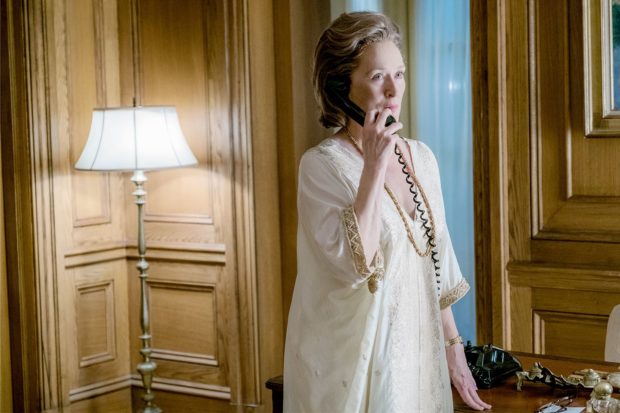 Steven Spielberg tackles the story of The Washington Post’s decision to print The Pentagon Papers, and the odyssey of courage by its publisher, played by Meryl Streep.
Steven Spielberg tackles the story of The Washington Post’s decision to print The Pentagon Papers, and the odyssey of courage by its publisher, played by Meryl Streep.
The Post, Steven Spielberg’s latest film, tells a complex and fascinating true life story—the decision by The Washington Post in 1971 to print The Pentagon Papers, a top-secret Defense Department study on the history of the Vietnam War, after The New York Times, which broke the story, had been ordered by a federal court to cease publication of that explosive document.
In addition to this overarching historical account, The Post is also a drama about the newspaper’s owner, Katharine Graham, played here by Meryl Streep, who had taken over as publisher from her husband after his death, at a time when women were not expected to take an active role in the management of a company, at least not one so male-dominated as this one. The dilemma surrounding whether or not to publish The Pentagon Papers is the fire in which Mrs. Graham’s leadership character, at first fearful and tentative, but then gradually more confident, is forged.
I thoroughly enjoyed The Post, with the immensely pleasurable quality of enjoyment I associate with an old-fashioned Hollywood style of moviemaking that is now unfortunately too rare. The screenplay is by Liz Hannah, along with one of the co-writers of another excellent recent newspaper film, Spotlight, John Singer. It co-stars Tom Hanks as the irascible and totally committed chief editor of the paper, Ben Bradlee. But leaving aside for a moment the fine acting, good screenplay, and the interest of the story in general, I was thrilled to find myself in the hands of someone who just loves to make movies, and sees cinema style as a worthy end in itself rather than a marketing strategy. Much of The Post is about process—all the thoughts, conversations, and actions that go into producing a daily newspaper, and Spielberg’s characteristically fluid camera follows all the details with evident joy, whether it’s a newsboy tasked with running an important document across town, or the publisher herself confronting a room full of self-important male board members—the film revels in its own detail, and you always know where you are, what the relationships are within the frame, and what results will naturally follow.
What I find disturbing in some of the responses to the film that I’ve read, and here I’m just taking a moment to step aside and editorialize, is that a generation raised on gimcrack superhero rubbish made by talentless mechanics may not be capable of understanding even the mainstream professionalism of a Spielberg anymore.
Anyway, the only false note here, in my opinion is when Spielberg tries to depict an antiwar demonstration—that’s not his strength—but otherwise his mastery depicting people working in groups, and of the privileged elite surrounding Streep’s character, is unmatched. Meryl Streep’s portrayal of emerging strength, through every mannerism and token of vulnerability at her command, is amazing. Hanks is great too, and a host of other character actors, including old comedy buddies Bob Odenkirk and David Cross performing together, incredibly, in a Spielberg film, help make The Post the triumph that it is.
This movie is part of an admirable strain in Spielberg’s work exploring American principles through historical events, including Amistad, Lincoln, and Bridge of Spies. In The Post, he celebrates the legacy of a free press challenging executive power, during an era when the press is being routinely attacked in public as “fake” or an “enemy,” when the very existence of truth is being disputed by unscrupulous demagogues. Nothing could be more timely than The Post.

A portrait of three women working at a Mumbai hospital pays tribute to all the struggling people in the great city. In a big...

George Orwell’s dystopian novel was made into a great film in the year of its title: 1984. I’m guessing most of you have at...

Hal Ashby’s film about two navy men assigned to escort a young sailor to the brig, is an example of how gritty, downbeat films...